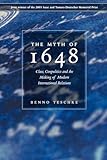The Myth of 1648 : class, geopolitics, and the making of modern international relation /Benno Teschke
Material type: TextPublisher number: ;Brijwasi Book Distributors | :H-87, Lalita Park laxmi Nagar Delhi 110092Publication details: New York : Verso, 2003Description: xii, 308 pages ; 24 cmISBN: 9781844673728Subject(s): History | History of Europe | State, The -- History | Feudalism -- Europe -- History | Europe -- Politics and government -- 1492-1648 | Europe -- Conditions sociales -- 17e siècle | Feudalism | Europe | International relations -- History | Relations internationales | Influence Literary, artisticDDC classification: 940 TES
TextPublisher number: ;Brijwasi Book Distributors | :H-87, Lalita Park laxmi Nagar Delhi 110092Publication details: New York : Verso, 2003Description: xii, 308 pages ; 24 cmISBN: 9781844673728Subject(s): History | History of Europe | State, The -- History | Feudalism -- Europe -- History | Europe -- Politics and government -- 1492-1648 | Europe -- Conditions sociales -- 17e siècle | Feudalism | Europe | International relations -- History | Relations internationales | Influence Literary, artisticDDC classification: 940 TES | Item type | Current library | Call number | Status | Date due | Barcode | Item holds |
|---|---|---|---|---|---|---|
 Books
Books
|
SNU LIBRARY | 940 TES (Browse shelf(Opens below)) | Not For Loan | 26458 | ||
 Books
Books
|
SNU LIBRARY | 940 TES (Browse shelf(Opens below)) | Available | 26459 | ||
 Books
Books
|
SNU LIBRARY | 940 TES (Browse shelf(Opens below)) | Available | 26460 | ||
 Books
Books
|
SNU LIBRARY | 940 TES (Browse shelf(Opens below)) | Available | 26461 | ||
 Books
Books
|
SNU LIBRARY | 940 TES (Browse shelf(Opens below)) | Available | 26462 |
Browsing SNU LIBRARY shelves Close shelf browser (Hides shelf browser)

|

|

|

|

|

|

|
||
| 940 CHA Irrawaddy Imperatives | 940 LEA Dual and the Oath | 940 MAR Hořká léta : Evropa = Bitter Years : Europe = Bittere Jahre : Europa | 940 TES The Myth of 1648 | 940 TES The Myth of 1648 | 940 TES The Myth of 1648 | 940 TES The Myth of 1648 |
1. Origins and Evolution of the Modern States-System: The Debate in International Relations Theory --
1. Introduction: From Structure to History --
2. Structural Neorealism --
3. Historicizing Realism --
4. Historicizing Constructivism --
5. Neo-Evolutionary Historical Sociology --
6. Neo-Marxist IR Theory --
7. Conclusion: Towards a New Theory of the Making of Modern International Relations --
2. Theory of Geopolitical Relations in the European Middle Ages --
1. Introduction --
2. Relation between the Economic and the Political in Feudal Society --
3. Structure-Agent Problem in Feudal Terms --
4. Phenomenology of Medieval 'International' Institutions --
5. Feudal 'International Systems': Beyond Anarchy and Hierarchy --
6. Conclusion: Geopolitical Systems as Social Systems --
3. Medieval Making of a Multi-Actor Europe --
1. Introduction: From Hierarchy to Anarchy --
2. Carolingian Empire --
3. Explaining the Transition from Imperial Hierarchy to Feudal Anarchy 84 --
4. New Mode of Exploitation --
5. Post-Crisis Feudal Expansion as Geopolitical Accumulation (Eleventh to Fourteenth Centuries) --
6. Conclusion: The Medieval Making of a Multi-Actor Europe --
4. Transitions and Non-Transitions to Modernity: A Critique of Rival Paradigms --
1. Introduction: The Rise of the West? --
2. Geopolitical Competition Model --
3. Demographic Model --
4. Commercialization Model --
5. Capitalism, the Modern State, and the Modern States-System: Solutions and Problems --
5. L'Etat, c'est moil: The Logic of Absolutist State Formation --
1. Introduction: Idealizing Absolutism --
2. Debating Absolutism: Transition or Non-Transition? --
3. Development and Nature of French Absolutism --
4. Conclusion: The Modernizing Limits of Absolutism --
6. Early Modern International Political Economy: Mercantilism and Maritime Empire-Building --
1. Introduction: The 'Long Sixteenth Century' and Mercantilism --
2. Theoretical Premises: Mercantilism as Commercial Capitalism --
3. Class Characters of Sea-Borne Trade and its Geopolitical Implications --
4. Did Mercantilism Promote Capitalism? --
5. Closed Trading States: Uniform Economic Territories? --
6. Conclusion: The 'Wealth of the State' versus the 'Wealth of the Nation' --
7. Demystifying the Westphalian States-System --
1. Introduction: Theorizing the Constitution, Operation, and Transformation of Geopolitical Systems --
2. Structure and Agency in the Westphalian Order --
3. Westphalian Geopolitical Relations: Foreign Policy as Dynastic Family Business --
4. Circulating Territories, Circulating Princes --
5. Dynastic Predatory Equilibrium and the Balance of Power --
6. Demystifying the Peace of Westphalia --
7. Conclusion: The End of 1648 --
8. Towards the Modern States-System: International Relations from Absolutism to Capitalism --
1. Introduction: From 'Structural Discontinuity' to a 'Mixed-Case' Scenario --
2. Transition from Feudalism to Capitalism in England --
3. Glorious Revolution and Modern Sovereignty --
4. British Uniqueness: Capitalism, Modern Sovereignty, and Active Balancing --
5. Geopolitically Combined and Socially Uneven Development --
Conclusion: The Dialectic of International Relations.
The Treaty of Westphalia in 1648 is widely interpreted as the foundation of modern international relations. Benno Teschke exposes this as a myth. In the process he provides a fresh reinterpretation of the making of modern international relations from the eighth to the 18th century.


There are no comments on this title.